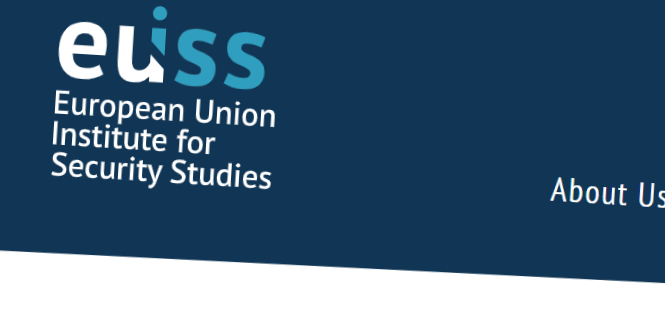(May 30. 2024 – European Union Institute for Security Studies, EUISS)
Moderator:
- Alice Ekman, Senior Analyst for China
Speakers:
- Rossella Marangio, Senior Analyst for EU-Africa
- Jan Joel Andersson, Senior Analyst for Common Security and Defense Policy (CSDP)
- Ondrej Ditrych, Senior Analyst for Russia and EU Eastern Neighbourhood
The purpose of this conference organized by the EUISS was to explore the intensification of contestation dynamics in recent years, which have profoundly shaped the global political landscape. Contestation refers to various actors, such as states, state coalitions, or non-state groups, challenging the established norms, structures, and institutions of global governance. These challenges manifest through tensions, rivalries, and conflicts of interest on political, economic, social, and environmental issues globally. Contestation can take many forms, including military confrontations, diplomatic negotiations, influence campaigns, struggles for membership in alliances or international organizations, or debates on global norms and policies. Understanding these dynamics is crucial for comprehending the shifts in international relations and their impact on global governance. This event report refers to the latest Chaillot Paper published by EUISS.
Territorial disputes and the resurgence of violent conflicts
According to Jan Joel Andersson, Senior Analyst for Common Security and Defense Policy (CSDP), optimism after the Cold War was propice for more peaceful international relations. However, recent years have seen an increase in conflicts involving various state and non-state actors and the emergence of new forms of hybrid warfare. Global military spending has reached record levels due to conflicts in Ukraine, the Middle East, and tensions in East Asia. International organizations like the UN and OSCE are under pressure, and the EU, despite being actively involved in conflict management, faces normative challenges. Rivalries among major powers threaten the existing international order, necessitating concerted action to maintain global peace and security. As said during the event, understanding the resurgence of violent conflicts and hybrid warfare helps identify the pressures on international organizations and the need for robust conflict management strategies.
The emergence of new modes of hybrid warfare, such as online disinformation and cyberattacks, complicates conflict resolution efforts. Additionally, regional conflicts are exacerbated by global geopolitical rivalries, such as the competition between the United States and China for influence in the Asia-Pacific region. Regional coalitions, such as NATO and the African Union, play crucial roles in conflict management and peace promotion.
Issue-based contestation: climate finance, debt, tax regimes, and credit agencies
Rossella Marangio, Senior Analyst for EU-Africa, highlighted Africa’s increasing assertiveness on the international stage, demanding a greater role in global governance since the end of the Cold War. This is evident in specific challenges such as fiscal governance and climate policies. Africa contests international standards in taxation and climate policies, which are perceived as marginalizing African countries. For example, the UN General Assembly approved a resolution proposed by Nigeria on behalf of the African Group to reform the international tax system. Developed countries have favored a lighter approach, while developing countries have supported a more mandatory framework. Discussing these contestations is relevant for Rossella Marangio as it illustrates Africa’s efforts to reshape global governance to better reflect its interests.
Africa also reacts to the EU’s Carbon Border Adjustment Mechanism (CBAM), expressing concerns about its impact on local economies and green transitions. Economic projections highlight potential risks for economic growth in Africa when CBAM is implemented. It is suggested that the EU should collaborate with the African Union to identify common ground to address challenges such as establishing effective international tax standards and reducing greenhouse gas emissions. The EU-Africa partnership offers an opportunity to mobilize climate finance and facilitate green transitions. As explained by Rossella Marangio, it underscores the importance of cooperative approaches to address shared global challenges and ensure fair treatment of developing countries.
Normative contestation over Human Rights, domestic governance, and global governance architecture
Finally, Ondrej Ditrych, Senior Analyst for Russia and EU Eastern Neighbourhood explained that Russia projects a “Normative Power Russia” to contest the global normative order, positioning itself as a counterweight to Western dominance. This is reflected in initiatives such as resolutions at the UN to promote its interests and challenge Western norms. The strategy aims to reshape the global order in Russia’s favor, opposing Western values and institutions. NPR differs from “Normative Power Europe” by promoting a conservative political utopia, emphasizing traditional values and stability. Russia uses tactics such as disinformation and influence campaigns to achieve its goals. It also seeks to forge alliances with other like-minded states while actively contesting Western initiatives on human rights and democratic governance. Discussing Russia’s normative contestation reveals the ideological and strategic conflicts that are reshaping global governance and challenging Western-led norms.
Russia’s attempts to influence elections and democratic processes in other countries undermine the legitimacy of international democratic institutions. Additionally, the tensions between Western and Russian perspectives on global governance reflect fundamental differences in concepts of national sovereignty and human rights. These differences contribute to a broader ideological slop in global governance debates, complicating efforts to forge consensus and cooperation on key international issues.

